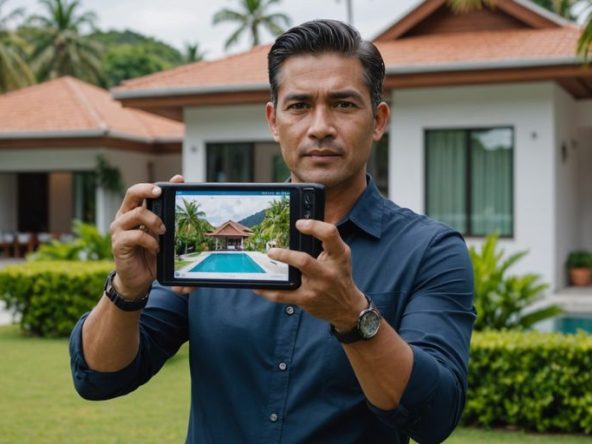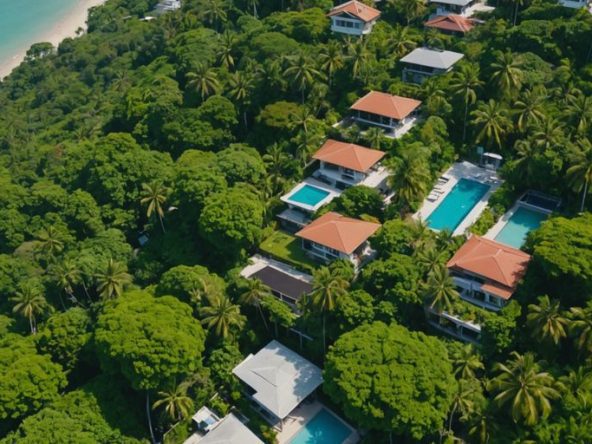Foreigners interested in buying property in Koh Samui have several options available to them, despite the restrictions imposed by Thai law. While direct land ownership is not permitted, there are alternative methods to acquire property, such as leasehold agreements, setting up a Thai limited company, or purchasing condominium units. This article explores the various legal frameworks, options, and considerations for foreigners looking to invest in real estate on this beautiful island.
Key Takeaways
- Foreigners cannot directly own land in Koh Samui, but they can own structures or apartments built on the land.
- Leasehold agreements allow foreigners to lease land for up to 30 years, with the possibility of renewal.
- Setting up a Thai limited company is a common method for foreigners to control land and property.
- Foreigners can fully own condominium units, although there are restrictions on the number of units available for foreign ownership.
- Marrying a Thai national is another way for foreigners to acquire property, but it comes with legal implications and potential risks.
Legal Framework for Foreign Land Ownership in Koh Samui
Foreigners interested in acquiring property in Koh Samui must navigate a complex legal landscape. Under Thai law, foreigners cannot directly own land. However, they can own structures or apartments built on the land. This legal framework is primarily governed by the Land Code Act of 1954 and the Investment Promotion Act of 1977.
Restrictions on Land Ownership
Foreigners are prohibited from owning land in Thailand, including Koh Samui. To purchase property, they must either establish a Thai Limited Company to buy the land on their behalf or enter into a leasehold agreement, which allows them to lease the land for a minimum of 30 years and a maximum of 90 years.
Exceptions to the Rule
While direct land ownership is restricted, there are exceptions. Foreigners can own up to 49% of the units in a condominium building. Additionally, certain investment incentives under the Investment Promotion Act of 1977 may provide avenues for land ownership under specific conditions.
Recent Legislative Changes
Recent legislative changes have aimed to clarify and sometimes tighten the rules surrounding foreign land ownership. These changes are often influenced by economic and political factors, and it’s crucial for potential investors to stay updated on these developments.
Successfully navigating these laws can make villa rental in Koh Samui very lucrative for the owners.
Options for Foreigners to Acquire Property in Koh Samui
Leasehold Agreements
Foreigners can enter into leasehold agreements to gain control over land in Koh Samui. These agreements typically last for 30 years and can be renewed twice, making it a viable long-term option. Leasehold agreements provide a legal framework for foreigners to manage and utilize land without direct ownership. This method is particularly popular for short term rentals, offering flexibility and security.
Thai Limited Company
Another option is to establish a Thai Limited Company. By doing so, foreigners can effectively control the land through the company. The company must be majority-owned by Thai nationals, but foreigners can hold up to 49% of the shares. This structure allows for greater control and potential investment opportunities.
Condominium Ownership
Foreigners are allowed to own condominium units freehold under Thai law. However, there are restrictions: only 49% of the total floor area of all units in a condominium project can be owned by foreigners. This option is attractive due to its simplicity and the potential for property appreciation.
While these options provide pathways for property acquisition, it’s crucial to conduct thorough due diligence and consult legal experts to navigate the complexities of Thai property laws.
Leasehold Agreements: A Viable Option

Leasehold agreements present a practical and legally sound method for foreigners to gain property ownership in Koh Samui. This approach allows individuals to lease land for a specified period, typically up to 30 years, with options for renewal. The 30 + 30 + 30 leasehold method is particularly popular, enabling foreigners to register and legally own the building structure on the leased land.
Duration and Renewal Terms
Leasehold agreements in Thailand generally span 30 years, the maximum term allowed by law. However, these leases can often be renewed for additional 30-year periods, potentially extending the total lease duration to 90 years. Some contracts even allow for renewal at any time during the lease term, providing flexibility and long-term security.
Legal Protections
Foreigners entering into leasehold agreements benefit from legal protections that ensure exclusive possession of the property for the lease term. These contracts are registered at the Land Office, offering a layer of security and formal recognition. Additionally, leasehold agreements can be structured to allow conversion to freehold ownership through a Thai holding company, adding another dimension of legal protection.
Financial Considerations
Leasehold agreements are often more financially accessible than other property ownership methods. They typically require lower upfront costs compared to purchasing freehold property. Moreover, the long-term nature of these leases provides a stable investment environment, making it an attractive option for those looking to own property in Koh Samui without the complexities of forming a Thai limited company.
Leasehold agreements offer a balanced approach to property ownership, combining legal security with financial feasibility, making them a viable option for foreigners in Koh Samui.
Establishing a Thai Limited Company for Property Purchase

Legal Requirements
Establishing a Thai Limited Company is a common method for foreigners to acquire property in Koh Samui. The company must have a majority of its shares (at least 51%) held by Thai nationals or entities. Foreigners can hold up to 49% of the company’s shares, allowing them to control the property indirectly. The company must be registered and conduct legitimate business activities within Thailand.
Ownership Structure
The ownership structure of a Thai Limited Company involves Thai shareholders holding the majority stake. Typically, two Thai shareholders are required, and they must be genuine investors with the appropriate funds. The foreign shareholder can then acquire control over the property through their ownership stake in the company. This method is often used for purchasing Villas For Sale Thailand and Luxury Villa In Thailand.
Pros and Cons
Pros:
- Allows foreigners to indirectly own land in Thailand.
- Provides a legal framework for property acquisition.
- Can be used for various types of properties, including short term rentals.
Cons:
- Requires involvement of Thai shareholders, which can be complex.
- Legal and administrative costs can be high.
- Potential risks if the Thai shareholders are not genuine investors.
Establishing a Thai Limited Company offers a viable route for foreigners to invest in Koh Samui’s real estate market, but it requires careful planning and legal due diligence.
In summary, while establishing a Thai Limited Company can be a practical solution for acquiring property in Koh Samui, it is essential to navigate the legal requirements and ownership structure carefully. This method provides an opportunity to invest in properties like Villas For Sale Thailand and Luxury Villa In Thailand, but it also comes with its own set of challenges and considerations.
Condominium Ownership for Foreigners
Foreigners looking to invest in property in Koh Samui often find condominium ownership to be a viable option. Under Thai law, foreigners can own condominiums on a freehold basis, though there are restrictions on the number of units available for foreign ownership. Specifically, the total floor area of the apartments owned by foreigners cannot surpass 49 percent of the building’s total area. This means that out of 100 identically sized condos, only 49 are available to foreign buyers.
Freehold Ownership
Foreigners are allowed to own an apartment or condominium in their name, making it a preferred option for many non-citizens and expatriates. This type of ownership allows you to have a title deed with your name on it, providing a sense of security and permanence. For those not ready to handle the maintenance of a villa, owning a condo can be a more manageable and attractive option.
Limitations and Restrictions
Despite the benefits, there are limitations. If a building has already reached the maximum 49 percent foreign ownership, no additional units can be sold to foreigners. This restriction can sometimes make it challenging to find available units, especially in popular areas. Additionally, direct freehold ownership condominium units available to foreigners often demand higher prices than those held by Thai holding companies.
Investment Potential
The investment potential for condominiums in Koh Samui is significant. The island’s real estate market has been growing steadily, and owning a condo can offer good rental yields and capital appreciation. However, it’s essential to conduct thorough due diligence and consider factors such as location, developer reputation, and market trends before making a purchase.
For many non-citizens and expatriates, owning a condominium in Koh Samui is their preferred option. Maintaining an apartment or condo is easier than maintaining a villa or beach house, making it a practical choice for long-term investment.
In summary, while there are restrictions and higher costs associated with foreign condominium ownership in Koh Samui, the benefits of freehold ownership and the island’s growing real estate market make it a compelling option for foreign investors.
Marrying a Thai National to Acquire Property
Foreigners are not allowed to own land or have joint ownership of land as matrimonial property in Thailand. However, the Land Department permits Thai nationals married to non-Thai citizens to own land as personal property. This requires a joint statement with their foreign spouse, declaring that the funds used to purchase the land belong solely to the Thai spouse. Consequently, the land, and sometimes a house or condominium, is registered exclusively in the Thai spouse’s name and is not regarded as jointly owned.
Legal Implications
When a Thai national purchases property, it is essential to understand that the foreign spouse has no legal claim to the property. The property is considered the personal asset of the Thai spouse. This can have significant implications in the event of a divorce or the death of the Thai spouse.
Ownership and Asset Division
In the case of a divorce, the foreign spouse has no legal right to the property, as it is not considered a marital asset. Similarly, if the Thai spouse passes away, the property will be subject to Thai inheritance laws, which may not favor the foreign spouse. It is crucial to have a clear understanding of these legal aspects before proceeding with property acquisition through marriage.
Potential Risks
There are several risks associated with acquiring property through marriage. These include:
- Loss of investment: Since the property is registered in the Thai spouse’s name, the foreign spouse may lose their investment in case of a divorce or the death of the Thai spouse.
- Legal complications: Navigating Thai inheritance laws can be complex and may not always favor the foreign spouse.
- Financial dependency: The foreign spouse may become financially dependent on the Thai spouse, which can create an imbalance in the relationship.
It is advisable to consult with legal experts and financial planners to fully understand the implications and risks involved in acquiring property through marriage in Thailand.
For example, a luxury 6-bedroom sea view villa for sale in Samui, Thailand, could be purchased by a Thai national married to a foreigner, but the property would be registered solely in the Thai spouse’s name. This highlights the importance of understanding the legal and financial ramifications before making such a significant investment.
Financial and Legal Due Diligence
Hiring Legal Experts
Engaging a property lawyer is crucial during the buying process. They will investigate under due diligence, which involves researching the background and history of sellers, development companies, buildings, and potential legal complications. This includes conducting title searches to confirm that title details match registered Land Office records and that the seller legally owns the property. They also review contracts to ensure details are correct and fair for both parties.
Financial Planning
Before making a purchase, it is essential to conduct thorough research on the property and the seller. This includes checking for any outstanding debts or legal issues, as well as visiting the property to ensure it is in good condition. Being familiar with the currency used in Thailand is also important for financial planning.
Understanding Local Regulations
Understanding local regulations is vital to avoid potential legal issues. This includes knowing the restrictions on foreign land ownership and any recent legislative changes. It is also important to read through agency contracts very carefully, as agents may ask for a larger deposit and keep some of that deposit if due diligence fails.
Conducting due diligence is a critical step in the property buying process in Koh Samui. It ensures that you are making a wise investment and helps avoid potential legal and financial pitfalls.
Future Prospects for Foreign Land Ownership in Koh Samui
Government Proposals
The future of foreign land ownership in Koh Samui is currently under significant scrutiny. By the end of 2022, an Interior Ministry proposal regarding foreign land ownership was tentatively approved by the weekly cabinet meeting. This proposal, if fully enacted, could mark a substantial shift in the legal landscape, potentially allowing foreigners to own land directly under certain conditions. This development is being closely monitored by both local and international stakeholders.
Potential Impact on Real Estate Market
The potential for foreigners to own land directly could lead to a surge in property investments. As more foreigners discover the island’s potential, the demand for properties is likely to continue growing. This increasing demand could lead to higher property values and rental rates, benefiting investors. However, it is essential to consider the possible implications on the local community and economy, which may experience both positive and negative effects.
Expert Opinions
Experts have mixed views on the proposed changes. Some believe that allowing foreigners to own land could bring significant economic benefits, including increased foreign investment and tourism. Others caution that it may lead to inflated property prices, making it difficult for locals to afford housing. A balanced approach is necessary to ensure that the interests of both foreign investors and local residents are safeguarded.
The evolving legal framework and market dynamics make it crucial for potential investors to stay informed and seek professional advice when considering property investments in Koh Samui.
Common Pitfalls and How to Avoid Them
When considering property acquisition in Koh Samui, it’s crucial to be aware of common pitfalls and how to avoid them. Proper due diligence and understanding the local market can save you from potential financial and legal troubles.
Case Studies of Foreign Property Owners in Koh Samui
Successful Investments
One notable example is a luxurious 4-bedroom sea view villa in Koh Samui. This property, with its prime location, spacious living areas, and stunning views, has proven to be an ideal investment for holiday home, residence, or rental property investment. The owners have reported high occupancy rates and significant returns on their investment, making it one of the Best Beach Villas in the area.
Challenges Faced
Despite the success stories, there are also challenges that foreign property owners face. Legal restrictions and the need for thorough due diligence can be daunting. One owner shared their experience of navigating the complex legal landscape, emphasizing the importance of hiring local legal experts to avoid potential pitfalls.
Lessons Learned
From these case studies, several key lessons emerge:
- Thorough Research: Understanding local regulations and market conditions is crucial.
- Legal Assistance: Hiring a local legal expert can help navigate the complexities of property ownership.
- Financial Planning: Proper financial planning and consideration of all costs involved can prevent unexpected financial burdens.
Investing in Koh Samui real estate can be highly rewarding, but it requires careful planning and a clear understanding of the local market and legal framework.
Real Estate Market Trends in Koh Samui
Current Market Conditions
The real estate market in Koh Samui has been experiencing an upward trend, driven by robust tourism and a growing expatriate community. One recent trend is the increasing demand for luxury properties. As the island’s reputation as a high-end tourist destination grows, so does the demand for luxury villas and condos. This presents exciting opportunities for investors looking to tap into the luxury market.
Future Projections
Koh Samui has emerged as a booming real estate market, attracting investors from around the world with high rental yields and promising capital appreciation. The island’s robust tourism industry, coupled with its rapidly developing infrastructure, has fueled this growth. As a result, the market is teeming with a wide array of properties, suitable for all types of investment goals.
Impact of Foreign Investment
Another trend is the increasing interest from foreign investors. As more foreigners discover the island’s potential, the demand for properties is likely to continue growing. This increasing demand could lead to higher property values and rental rates, benefiting investors. Koh Samui’s real estate market is also relatively stable compared to many other regions. The island has a strong economy, underpinned by tourism and a growing expatriate community. This economic stability ensures a consistent demand for properties and protects your investment from market fluctuations.
The real estate market in Koh Samui offers a unique blend of stability and growth potential, making it an attractive option for both local and international investors.
Key Highlights
- Luxury Villas For Sale: The demand for high-end properties is on the rise.
- Best Villa In Thailand: Koh Samui is becoming a top destination for luxury real estate.
- Phuket Real Estate Market: Comparatively, Koh Samui offers a more stable investment environment.
- Best Luxury Villa: Investors are increasingly looking at Koh Samui for premium properties.
- Real Estate Phuket Thailand: While Phuket remains popular, Koh Samui is quickly catching up in terms of investment potential.
Conclusion
In conclusion, while foreigners face certain legal restrictions when it comes to owning land in Koh Samui, there are several viable options available for those interested in investing in property. Foreigners can own condominium units outright, lease land for extended periods, or establish a Thai Limited Company to hold land on their behalf. Each of these methods has its own set of legal requirements and caveats, but they provide feasible pathways for foreign investors to own and control property in this beautiful part of Thailand. It is essential for potential buyers to thoroughly understand Thai property laws and seek professional legal advice to navigate the complexities of property ownership in Koh Samui.




